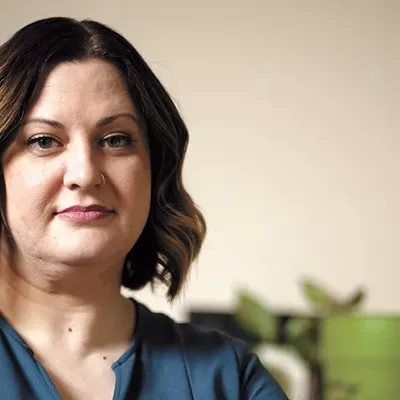In our March 8 cover piece, “The People Left Behind,” The Inlander did something a lot of media — locally and nationally — do their best to avoid: We talked about suicide.
It started two years ago, when we heard of 13-year-old Casey Holliday’s suicide from the Monroe Street Bridge. After we spoke with her family, and saw how it tore them apart, we heard from experts, politicians and even Casey’s parents that the only way to start preventing deaths like hers is to talk — as a community, as families and as individuals — about the issue.
And after our story hit stands, we were overwhelmed with feedback from readers who wanted to talk. Some felt called to action after hearing Casey’s story — asking for volunteer opportunities and ways to contribute. Some had experienced the death of a loved one by suicide and felt consolation reading that other people were willing to talk about the deaths that had long haunted them. They didn’t feel so alone anymore.
Local suicide expert Paul Quinnett, of the QPR Institute, which trains people worldwide in suicide-prevention strategies, says one reader contacted him about becoming a QPR instructor. “We have very few certified instructors in the area, and if people want to help, they certainly can,” he writes in an email.
“The facts are that many youth — whose neurological development is far from complete — make impulsive and poorly considered life-threatening and life-ending decisions all the time, and one of them is suicide,” Quinnett says. “Some of us believe we must start much earlier in the educational development of any young person and begin to teach that, ‘If you have a first, second, and third thought that suicide would solve the problems you are experiencing right now, you need help right now!’” Since our story went to press, there’s been action in Olympia, too. On March 7, House Bill 2366, which would require health professionals statewide to “complete education in suicide assessment, treatment and management,” landed on Gov. Christine Gregoire’s desk. The governor has 20 days to sign the bill, which passed through the House and Senate unanimously. If she does not sign in that time period, the bill will automatically be come a law, according to governor spokeswoman Abbey Corzine.
Unless Gregoire puts the brakes on — which no one expects — this would mean that even more people would start talking about suicide prevention.
Reaction to 'Left Behind'
It Takes Time
Thank you for the story on Casey and the ones who are left behind to deal with the pain and the loss. As a survivor of suicide of my only son, Clayton, I can relate to what was written. How we struggle to put the pieces together and give reason where there is none. Loss is difficult. Sudden, unexplained loss leaves one aching to the bottom of one’s soul.
When I could finally laugh again, I knew that I would heal from the pain — even though my life would never be the same. I am thankful for programs like Hospice of Spokane, which has a survivor-of-suicide support group, and GriefShare support groups (www.griefshare.org). Both have offered comfort to people going through these situations. It takes time to get to some type of normal, but it does happen.
Lori McElhaney
Spokane, Wash.
Crisis Lines Do Work
When I lived in Montana, I worked as a volunteer for the Great Falls Crisis Line for a total of 17 years. There were many times that I talked people out of committing suicide, and that, in and of itself, was the best pay a person could have. People get so focused on solving their problems by ending their life that they don’t stop to consider anyone around them and how it would affect the people they leave behind. Once you point that out to them, the reality of what they are considering hits them and they can change their mind.
I talked to a person who was so distraught, he wanted to end his life and had a plan. He was going to get his children ready for school, send them out the door and then take his life at home. I asked him: “What are your kids going to think when they come home from school? How are they going to feel?” He said, “You’re right. I didn’t think about that.” We talked for a while, and when I could tell that he would be OK, we ended the call.
Julie Martin
Spokane, Wash.
Say A Prayer
Thank you for the story about Casey Holliday. I remember hearing about it at the time, and she and her family have often crossed my mind since. Two years ago, I was a member at the Oz Fitness downtown and often worked out twice a day. I would always park in the lot at the north end of the Monroe Street Bridge when I went to the gym. I loved walking across the bridge and looking at the river and the beautiful view of downtown from there.
But since that day, it’s never been the same. I now stop for a minute, right in the middle where someone had hung her picture and some flowers at one time, and say a quick prayer for her and her family. And then I think if it affects me, a stranger, in that way, I cannot even imagine what her family must go through on a daily basis.
I also want to comment on the possibility of building some kind of barrier to keep people from jumping. I think the idea that it would take away from the looks of the bridge should be the least of our worries. Lives are far more important than aesthetics. If the city of San Francisco is going to spend millions of dollars to erect a barrier on the Golden Gate Bridge, there’s no reason our city can’t do the same.
The quote in the article that struck me the most was, “You can’t solve a problem that you can’t talk about.” So thank you for bringing this story to light. I had no idea how prevalent suicide was in our area, or the lack of QPR trainers we have. I hope that Casey’s story will teach us all something. Mostly I hope it will help people realize how valuable a life really is.
Tiffany Korver
Spokane, Wash.
Let’s Remove The Stigma
I’m glad you took the time to research the issue of suicide. It is so unfortunate and sad. I think this issue needs and warrants a lot more discussion — yes, there is a big stigma attached to mental illness.
I myself suffer from depression, and it is very tough to deal with. Especially when you’re in such despair, you feel like no one understands why you feel so despondent and alone. It is so terrible sometimes. I firmly feel if there was more published in newspapers and magazines, it would help people so much, whatever their age.
Your article is a very well-done piece of work, and long overdue.
Lynne Sheets
Spokane, Wash.



















